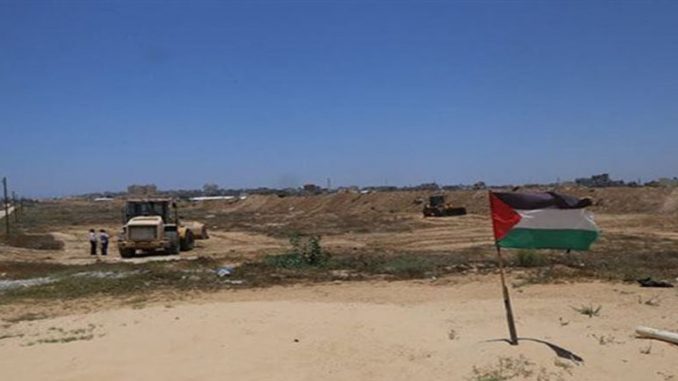
The Hamas-run Interior Ministry in the Gaza Strip has announced new measures to “increase control and enhance security” at the territory’s southern borders with Egypt, including the establishment of a 100-meter-wide “buffer zone” there.
Gaza’s Interior Ministry said in a statement on Wednesday that the first phase of the new measures also includes paving the 12-kilometer long road along the borderline, where surveillance cameras, watchtowers, and lights will be installed.
Bulldozers were also reportedly expected to demolish a series of homes and structures along the border.
Deputy Interior Minister Tawfiq Abu Naim, who made a preliminary visit to the border area amid preparations for the plans earlier this month, confirmed that the procedures came as a result of a recent visit by a Hamas delegation to Cairo.
Abu Naim said that the buffer zone being constructed inside Palestinian lands will become “a closed military zone,” in order to facilitate the surveillance and preventing drug smuggling and the infiltration of “wanted men” — presumably referring to fugitives wanted by Egypt.
The deputy minister pointed out that these procedures would continue until “complete control” was achieved over the southern border.
“Egyptian national security is Palestinian national security. No threat to the stability of security conditions on our southern borders would be allowed,” the ministry’s statement quoted Abu Naim as saying.
The announcement came as Hamas has increased efforts to improve ties with Cairo, which has long accused the de facto Gaza ruling party of aiding an insurgency in the northern Sinai Peninsula, which has been met with a harsh ‘counterterrorism’ crackdown by Egyptian authorities.
In April 2016 Hamas set up dozens of new border posts in an attempt to improve relations with Egypt.
While Hamas has consistently denied allegations of involvement in the Sinai insurgency, the Palestinian political faction has a vested interest in increasing security cooperation with Egypt, amid a diplomatic siege by Egypt and other Arab countries on Hamas’ long-time supporter Qatar, where the former head of Hamas’ politburo was based.
In the initial days of the diplomatic crisis, Qatar’s relationship with the Hamas “terror group” was cited as a main justification for the siege, but in the end, severing ties with Hamas did not make it on Saudi Arabia’ list of demands to Doha.
Now that Hamas’ leadership is concentrated in Gaza, the political party is dependent on the goodwill of the Egyptian government to maintain its leaders’ freedom of movement through their shared border, where Cairo has enforced a brutal, decade-long Israeli siege.
Meanwhile, Hamas’ strengthened relationship with Egypt comes amid a growing alliance with discharged Fatah leader Muhammad Dahlan — with whom Hamas has confirmed an alliance to challenge the Ramallah-based Palestinian Authority (PA).
Dahlan reportedly met head of Hamas in Gaza Yahya Sinwar during the visit to Cairo — supposedly without the knowledge of overall Hamas leader Ismail Haniyeh, indicative of a political split within the party — which was followed by a leaked report alleging that Dahlan was slated to be appointed as head of Gaza’s de facto government.
Hamas’ shifting allegiances come as Palestinians trapped in Gaza are coping with just a few hours of electricity a day after Israel drastically reduced electricity supplies to the enclave, and rights groups have insisted Israel bears the brunt of responsibility for the crisis despite the ongoing Fatah-Hamas feud.



